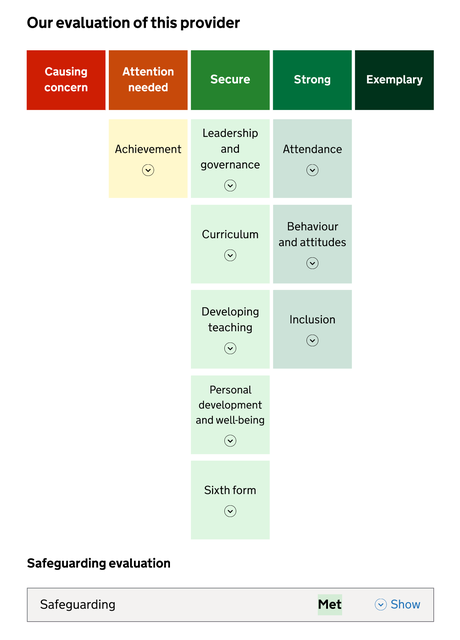The sister of headteacher Ruth Perry has said she is worried that new Ofsted proposals for inspecting schools are a “rehash” of the “dangerous” system they are supposed to replace.
Schools in England could be graded across a variety of different areas – including attendance and inclusion – using a colour-coded five-point scale.
Schools would receive ratings – from the red coloured “causing concern” to orange coloured “attention needed”, through the green shades of “secure”, “strong” and “exemplary” – for each area of practice under proposals for Ofsted’s new report card system.
The Government announced last year that headline Ofsted grades for overall effectiveness for schools in England would be scrapped.
Previously, Ofsted awarded one of four single-phrase inspection judgments: outstanding, good, requires improvement and inadequate.
The reforms follow criticism of the inspection system following the death of headteacher Mrs Perry who took her own life after an Ofsted report downgraded her Caversham Primary School in Reading from the highest to the lowest overall effectiveness rating over safeguarding concerns.
Her sister Professor Julia Waters said that while the new model has some improvements, it “retains many of the dangerous features of the previous system, while introducing a series of changes with potential new risks to the wellbeing of teachers and headteachers”.
Prof Waters said: “My sister Ruth Perry died as the result of a rude and intimidating Ofsted inspection, and its disproportionate consequences on her and her school.
Ruth Perry took her own life after an Ofsted inspection (University of Reading/PA)
“It is two years since Ruth’s death, and a year since Sir Martyn Oliver took charge of Ofsted.
“Ofsted says it has listened, but it still does not appear to have adequately learned.
“I am worried that this proposal is a rehash of the discredited and dangerous system it is meant to replace.”
Prof Waters said the proposal appears to have fed the single-word judgments “through an online thesaurus”, adding that “other elements of the report card design are ill-thought-through and potentially dangerous”.
Under the proposals from the inspectorate, at least eight areas of a school’s provision could be evaluated and graded – accompanied by short summaries of inspectors’ findings – in a report card for parents.
The proposed evaluation areas would be leadership and governance, curriculum, developing teaching, achievement, behaviour and attitudes, attendance, personal development and wellbeing, and inclusion.
Schools which have early years provision or a sixth form would also be graded separately on these areas.
Safeguarding would not be graded with the five-point scale and instead it would be assessed as either met or not met under the plans.
The proposals have been criticised by Paul Whiteman, general secretary of school leaders’ union NAHT, who said they “suggest an inspectorate determined to hold on to a model of inspection that is long past its sell-by date”.
And Pepe Di’Iasio, general secretary of the Association of School and College Leaders (ASCL), said the proposed school report cards “appear to be even worse than the single-word judgments they replace”.
Inspectors will look at how well schools support vulnerable and disadvantaged children, including those with special educational needs and disabilities (Send), as part of a new focus on inclusion.
Previously, schools were judged on quality of education, behaviour and attitudes, personal development and leadership and management.
In the consultation document, Ofsted said: “We will continue to call out unacceptable practice, as we have always done. That is our duty, and it’s a moral duty as much as a professional one.
An example of the proposed Ofsted report card (Ofsted/PA)
“But these proposals allow us to highlight poor practice with more precision – pointing laser-like to specific issues, not shining a floodlight on the whole provider.”
Sir Martyn, chief inspector of Ofsted, said the death of Mrs Perry has been on his mind “ever since it happened”.
He said the “beauty” of a report card – which he said is “a bit like a child’s school report card” – is that it is different from the previous system in that it is “fairer” and “more proportionate”.
“It highlights all the things that schools excel at as well as those where they could improve.
“And our report card will give a far better balanced, more realistic and a fairer picture of all of a school’s strengths and areas for improvement,” he said.
Ofsted is also proposing that all schools with an identified need for improvement will receive monitoring calls and visits to check that timely action is being taken to raise standards.
This includes schools with any evaluation area graded “attention needed”.
From November, it is proposed that Ofsted will no longer carry out ungraded inspections of state schools which means every school will know that its next routine Ofsted inspection will be a full, graded one.
Under the proposals, the watchdog will also include more contextual data in inspections and reports – such as learner characteristics, absence and attendance figures, and local area demographics.
Inspectors will use this information to help understand the circumstances in which leaders are operating.
Education Secretary Bridget Phillipson will make a speech about the overhaul, as a 12-week consultation is launched on Monday.
Ms Phillipson will cast the reforms as a “more rigorous system, raising the bar of our expectations, on what good really looks like when it comes to the futures of our children”.
The Education Secretary is expected to add: “Our proposals will swap single headline grades for the rich, granular insight of school report cards.
“Raising the bar on what we expect from schools, shining a light on all the areas that matter, each given their own grade.
“Identifying excellence and rooting out performance that falls short of expectations, so that parents have clearer, better information about their local schools.”
Her wide-ranging speech is also expected to set out the Government’s education plans, including on delivering improved outcomes for children from disadvantaged backgrounds.
Ofsted will publish a report on the outcome of the consultation in the summer, and the final agreed reforms will be implemented from this autumn.
Sir Martyn said: “Our mission is to raise standards and improve the lives of children, particularly the most disadvantaged. Today’s proposals for a new Ofsted report card and a new way of inspecting are designed to do just that.
“The report card will replace the simplistic overall judgment with a suite of grades, giving parents much more detail and better identifying the strengths and areas for improvement for a school, early years or further education provider.
“Our new top ‘exemplary’ grade will help raise standards, identifying world-class practice that should be shared with the rest of the country.”

